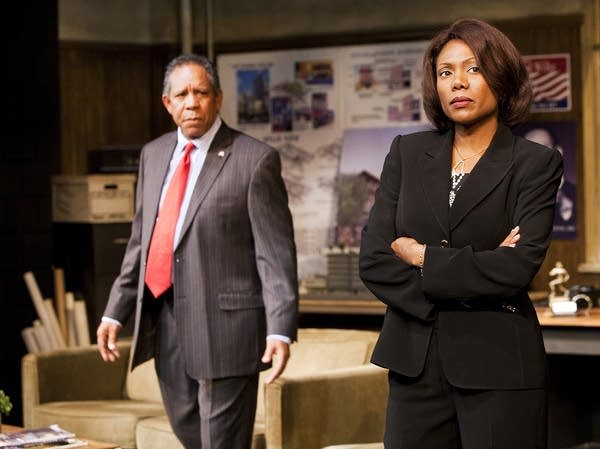Penumbra Theater stages final Wilson work 'Radio Golf'
Go Deeper.
Create an account or log in to save stories.
Like this?
Thanks for liking this story! We have added it to a list of your favorite stories.

St. Paul's Penumbra Theater is regarded as one of the country's foremost interpreters of Pulitzer Prize-winning playwright August Wilson's work, making Penumbra's first staging of Wilson's last play, "Radio Golf," an event in the local theater scene.
August Wilson wrote ten plays chronicling, probing and revealing the African-American experience in the 20th century, setting each play in a different decade. It's a remarkable, some might say unequaled, achievement in modern theater. Wilson finished "Radio Golf,' the final play in the cycle, in 2005 as he was dying of cancer. This makes it incredibly poignant for his friend, Penumbra Artistic Director Lou Bellamy.
"It's almost as though the ink on the page were blood, and I don't say that lightly," Bellamy said. "I mean literally, he ran out his life and this play together, and that makes it very special for me."
In Wilson's other plays, you can feel the weight of racism and white oppression bearing down on the characters. But in "Radio Golf," their fate and future, more than ever, seems to lie in their own hands.
Turn Up Your Support
MPR News helps you turn down the noise and build shared understanding. Turn up your support for this public resource and keep trusted journalism accessible to all.
The story takes place at the height of the 'Go Go '90s' in the Hill District of Pittsburgh, the setting for all but one play in Wilson's cycle. Harmond Wilks, an Ivy League-educated developer, is running for mayor and also bringing his own brand of urban renewal to the 'hill' in the form of a massive high-rise apartment complex. When he learns an old house with roots back to the first days of slavery sits in the middle of the blighted property, the preservationist in Wilks surfaces.
"I would have been here earlier but I got a call back from Starbucks in Seattle," Wilks says. "Now they still need to see the new drawings but they love the idea. They think it'll make great publicity about preserving the house, preserving the community."
Wilks is confronted by his partner Roosevelt Hicks.

"Harmon, man, you need to step back, get some perspective," says Hicks.
Hicks is a wannabe real estate tycoon whose ambition numbs him to the tug of history.
"I've been putting out fires all day, cleaning up after you," Hicks continues. "You made a mess. At 10 o'clock this morning there was no Bedford Hills. The project collapsed. I've been dancing on the phone for hours trying to bring it back."
In the play, Bellamy said., two opposing challenges are tearing at Harmond Wilks; progress and prosperity versus cultural conservation.
"That is the conundrum that Harmond Wilks has to deal with, whether or not the past will be destroyed as we move into the future, or do we pick up where that past took us and move into the future from there," Bellamy said.
In "Radio Golf," Wilson directly poses the question of what responsibility the black community has to itself and its culture. Bellamy said in the protagonist of Harmond Wilks, Wilson also was prophetic.
"One of the characters asks him are you going be the mayor of the white people, or are 'you going be the mayor of the black people,' and he says 'I'm going to be the mayor of all the people,' " Bellamy said. "Does that sound familiar? I mean you know, it sounds like our president speaking right now."
Theater critic Quinton Skinner calls "Radio Golf" a play that sneaks up on you.
"It doesn't, on the surface, have the grand scope of a lot of, kind of iconic August Wilson plays," Skinner said. "It takes place entirely in kind of a seedy real estate development office as a matter of fact. But as the play goes on you begin to realize that the past is inescapable."
There appears to be a consensus among critics that Radio Golf isn't August Wilson's best play. It's not Quinton Skinner's favorite either, but he says remember, the standard Wilson set is awfully high.
"This is really a case where an artist is bearing the weight of their previous work," he said. "If this had been a new play by an unheard of playwright, we'd probably be talking about how amazingly insightful and powerful it is."
Skinner said Penumbra's production of Radio Golf represents a historical moment that theatergoers need to seize. He said it's a must see play because it's August Wilson's last, and because Lou Bellamy and Penumbra's veteran cast, a crew Wilson trusted as much as anyone to articulate his vision on stage, is performing it.
Dear reader,
Political debates with family or friends can get heated. But what if there was a way to handle them better?
You can learn how to have civil political conversations with our new e-book!
Download our free e-book, Talking Sense: Have Hard Political Conversations, Better, and learn how to talk without the tension.





